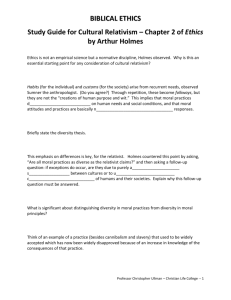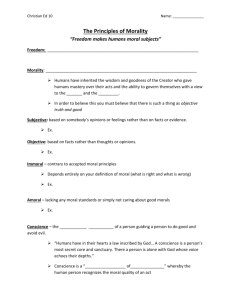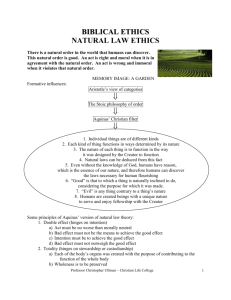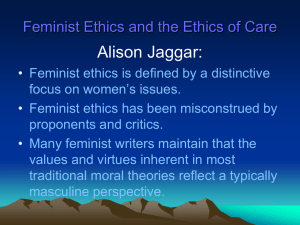Chapter 4 of Ethics by Arthur Holmes
advertisement
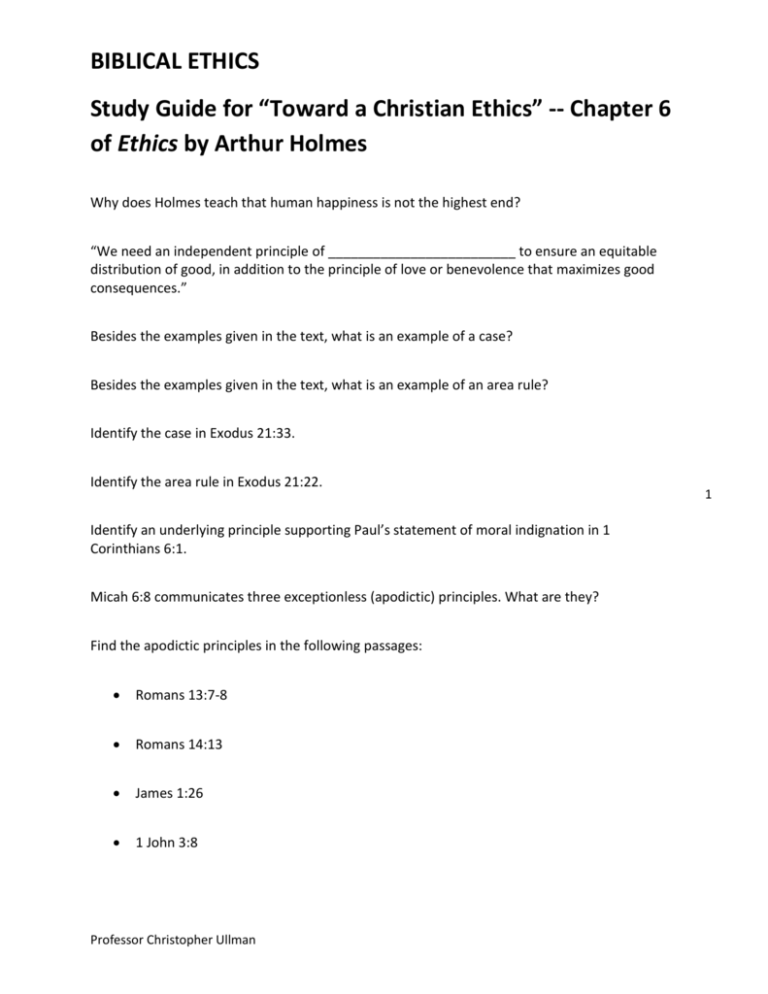
BIBLICAL ETHICS Study Guide for “Toward a Christian Ethics” -- Chapter 6 of Ethics by Arthur Holmes Why does Holmes teach that human happiness is not the highest end? “We need an independent principle of _________________________ to ensure an equitable distribution of good, in addition to the principle of love or benevolence that maximizes good consequences.” Besides the examples given in the text, what is an example of a case? Besides the examples given in the text, what is an example of an area rule? Identify the case in Exodus 21:33. Identify the area rule in Exodus 21:22. Identify an underlying principle supporting Paul’s statement of moral indignation in 1 Corinthians 6:1. Micah 6:8 communicates three exceptionless (apodictic) principles. What are they? Find the apodictic principles in the following passages: Romans 13:7-8 Romans 14:13 James 1:26 1 John 3:8 Professor Christopher Ullman 1 BIBLICAL ETHICS A person says to you, “There are no distinguishable areas of unchanging responsibility, no action spheres we all have in common.” As a Christian, how will you respond to him/her? What is the base of egoism? What is the base of utilitarianism? What is the base of Biblical ethics? What can we do when we are faced with ethical dilemmas, cases in which the solution unavoidably results in violating at least one moral rule? Holmes provides two methods. R_______________ moral rules according to their centrality to one’s underlying principles. F_______________ rules to govern exceptions to rules. (Now view the next page for the study guide on moral knowledge.) Professor Christopher Ullman 2 BIBLICAL ETHICS Study Guide for “Moral Knowledge” -- Chapter 7 of Ethics by Arthur Holmes Relying on “common morality” to result in moral knowledge in a person has its problems. Name one. Relying on intuitive moral awareness of “conscience” is an alternative to relying on common morality. Name one problem with this approach. What do these Bible passages say about the human conscience? Genesis 20:5-6 Romans 9:1-2 1 Corinthians 4:4 1 Corinthians 8:7-12 1 Timothy 4:2 Hebrews 9:9-10 Name one way that intuitionism fall short as a way of understanding morality. How does the quest for beneficial consequences corrupt morality? Kant advocated doing one’s duty for duty’s sake. What did he mean by categorical imperative? Professor Christopher Ullman 3 BIBLICAL ETHICS What is Kant’s humanitarian principle? Kant had an extreme confidence that persons of good will could follow the categorical imperative. What was he overlooking? Find a verse in Romans 1 that teaches there is a general moral law accessible to all people at all times. Find a verse in Romans 2 that teaches there is a general moral law accessible to all people at all times. Find a verse in Romans 3 that teaches there is a general moral law accessible to all people at all times. Name four great thinkers who believed that natural law is what reason prescribes for the harmonious and just ordering of society. Kant and many natural law ethicists have to be studied with caution, since their approaches to morality depend heavily upon what they believe about the nature of p__________________. How could Old Testament prophets hold nations morally accountable that did not have access to the Jewish law? The Bible links the doctrine of creation to the standards of morality in Genesis 1, 2, 4, and 9. How do the following passages echo or elaborate this linkage? Proverbs 6:5-8 Proverbs 30:24-31 James 3:9 Matthew 19:4-8 Professor Christopher Ullman 4 BIBLICAL ETHICS Holmes lists four biblical indicators that can serve as starting points in achieving moral knowledge: 1. This is an ____________________ creation. 2. We were made in ______________ _____________. 3. There are areas of human action that are _______________, as revealed in the Ten Commandments, especially commandments 6-10. 4. There are divine appointments of some universal types of _____________ ______________, such as the husband-wife relationship in marriage. What are the three questions Holmes asks, with regard to any moral problem? 1. 5 2. 3. In determining the purposes of human activities, Holmes states, “Empirical generalizations about what people find fulfilling are not enough.” Why? “We must look for _________________________ indicators of what is _________________ and _________________________.” Professor Christopher Ullman
